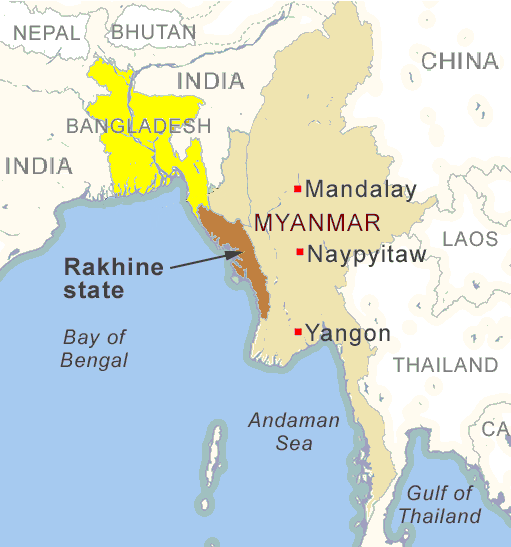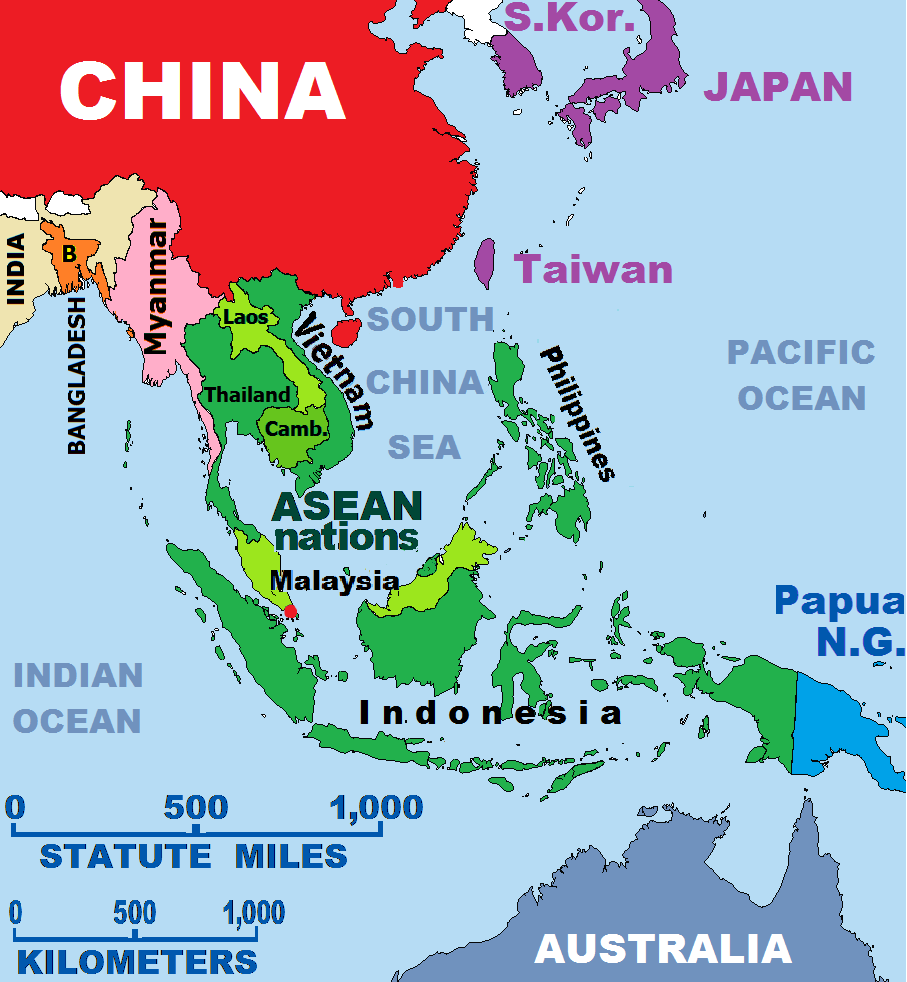
|
|
Rohingya refugees, who have escaped to neighboring Bangladesh, watch their villages burn,
© 2017 UNHCR
|

|
The Rohingya Crisis:
BACKGROUND Reports from
Major Media & Organizations
(UPDATED INTERMITTENTLY)
(also see:
Current Affairs Summary
)
|
|
KEY FACTS & NAMES:
The names Myanmar (official)
and Burma (traditional)
refer to the same country.
Rakhine State is Myanmar's coastal province where most of the violence has happened.
Rohingya Muslims were the majority there (particularly around the coastal district of Maungdaw Township), until this crisis.
Myamar's military, the notorious Tatmadaw, working with local Rakhines (a large Buddhist minority), attacked the Rohingya -- in 2012-2013, 2015, 2016-2017, and most brutally in 2017-2018 -- killing, torturing, wounding or raping tens of thousands of them -- ultimately driving most of the Rohingya out of Rakhine State into the neighboring country of Bangladesh.
Click on article titles to open.
Articles open in separate windows or tabs.
Articles are arranged in date order, oldest first. To jump to the end of the list, to see the latest news, CLICK HERE.
|
|
|
Special Topics:
Aung San Suu Kyi:
Myanmar's Military:
The Tatmadaw &
Gen. Min Aun Hlaing:
(Same topic at:
Myanmar army ruler takes prime minister role,
again pledges elections.
2021-08-01 - Reuters News Service
What Has Happened to Myanmar's Tatmadaw?
2021-09-13 -
OpEd in The Irrawaddy
ASEAN:
Myanmar army general
Min Aung Hlaing
excluded from leaders' summit
2021-10-16 - BBC News
AP: Myanmar military
uses systematic torture
across country
2021-10-16 - Associated Press
UN investigator:
Crimes against humanity under Myanmar junta
The head of the U.N. body investigating the most serious crimes in Myanmar says preliminary evidence collected since the military seized power on Feb. 1 shows a widespread and systematic attack on civilians "amounting to crimes against humanity."
2021-11-06 - AP / ABC News
As Soldiers Abandon Notorious Myanmar Army,
a Morale Crisis Looms
The number of defectors, while not enough to topple the Tatmadaw, is growing -- galvanized by the nationwide anti-coup movement.
2021-11-21 -
New York Times
Myanmar’s Min Aung Hlaing
accused of crimes against humanity
[in the International Criminal Court (ICC).]
2021-12-10 - Al Jazeera
(Arab news, Qatar)
[NOTE: This media has credibility and bias problems.]
Global Witness official statement:
Myanmar junta’s latest cash grab
highlights need for
stronger international response.
The Myanmar junta’s decision to hold an international gems emporium demonstrates the urgent need for tougher international measures -- including import bans and sanctions -- to ensure conflict resources are not turned into a financial lifeline for the cash-strapped regime.
2021-12-17 - Global Witness
(anti-conflict/anti-corruption NGO)
(Same topic at:
-
Al Jazeera
(Arab news, Qatar)
(Dec. 21)
|
BACKGROUND & ANALYSIS:
by Expert & Official Sources
-
Myanmar country profile
from BBC News.
-
The Rohingya Crisis in Myanmar
- updated continually;
...and...
-
Rohingya Crisis
- continually updated:
-- Human Rights Watch
-
ANALYSIS & OPINION:
How WWII shaped
the crisis in Myanmar.
by Jayita Sarkar, historian, Dartmouth College
The crises of the era laid the groundwork for the persecution of the Rohingya.
- Washington Post, 2019-03-10
-
Burma - State of Fear
PBS-TV documentary series
FRONTLINE-WORLD:
- 2006-10-31 PBS
(Public Broadcasting System)
-
The Rohingyas:
The most persecuted people on Earth?
- 2015-06-13
-- The Economist (London)
-
Is Rohingya persecution caused by
business interests rather than religion?
- 2017-01-04
-- The Guardian (U.K.)
more detail at:
-
Why do China, India back Myanmar
over the Rohingya crisis?
- 2017-10-18
-- South China Morning Post
"Heavy investments in Rakhine state have seen the two countries take a markedly different approach [compared] to the Western powers leaning on Suu Kyi’s beleaguered government."
-
Chinese Minister's spadework
lays the foundation for Suu Kyi's visit
- 2017-11-28
-- The Hindu (India)
-
Rohingya: India acts fast
to counter Chinese moves in Myanmar
- 2018-07-13
-- The Economic Times (India)
-
Rakhine,
the parlous state.
Escalating fighting, bitter and growing ethnic tensions, and mysterious killings, are blighting Rakhine State -- and the situation is unlikely to improve any time soon.
-
Frontier Myanmar (Myanmar/Burma)
(NOTE: This article appears independent, but this publication may be subject to Myanmar military control.)
(NOTE: This article is presented in RCN because it shows the current ethnic violence in Myanmar's Rakhine state (recently fled by most Rohingya, and to which they are supposed to be repatriated). This current violence is between ethnic Rakhine rebels (the "Arakan Army"), seeking control of Rakhine state ("Arakan"), and Myanmar's military, the "Tatmadaw," which is heavily dominated by the country's Bamar ethnic majority. Both factions are Buddhist, and have previously worked together to attack the Rohingya Muslims and Hindus during the recent years' purges in Rakhine state.)
-
ANALYSIS & EDITORIAL:
[China,]
Leave Myanmar in Peace
[China's offers of help are suspect;
China is not just helpful, it's also a problem.]
-
2019-11-15 - The Irrawaddy (Myanmar/Burma)
(NOTE: This media, while it has appeared to be relatively independent, may be subject to the control of the Myanmar military)
-
 Why ASEAN
Why ASEAN
Can't Ignore the
Rohingya Crisis
The Rohingya crisis is not just an issue for Myanmar; it will impact security and economic trends throughout the region.
- 2017 May 17:
-- The Diplomat
-
How Burma’s Rohingya crisis
went from bad to worse
- 2017 Sept. 6:
-- Washington Post
-
The Rohingya crisis:
Why won't Aung San Suu Kyi act?
- 2017 Sept. 8
-- BBC News
-
Why no country wants Rohingya,
why it’s so difficult to deport them
- 2017 Sept. 12 -- The Indian Express
-
The Rohingya in Myanmar:
How Years of Strife Grew Into a Crisis
- 2017 Sept. 13
-- New York Times;
-
also in Bangkok Post (Thailand)
-
The ‘ethnic cleansing’ of the Rohingya:
Scorched earth. Harrowing escapes. Half a million on the move.
- 2017 Sept. 18 -- Washington Post
-
The Misunderstood Roots
of Burma's Rohingya Crisis
- 2017 Sept. 25
-- The Atlantic
-
Myanmar Rohingya hatred
has roots in Buddhist nationalism
- 2017 Sept. 29
-- Fox News / Associated Press
-
Finding out the truth about ARSA militants
- 2017 Oct. 11
-- BBC
-
Hands Tied by Old Hope,
Diplomats in Myanmar Stay Silent.
- 2017 Oct. 12
-- New York Times
-
Opinion- Myanmar's moves against Rohingya
a get-out campaign- not genocide
- 2017 Oct. 14
-- Straits Times (Singapore)
-
Myanmar, Once a Hope for Democracy,
Is Now a Study in How It Fails.
- 2017 Oct. 19
-- New York Times
-
Will the "Myanmar democracy”
survive the Rohingya crisis?
(Essay & analysis by
former Bangladesh ambassador &
cabinet secretary Mahmood Hasan)
- 2017 Nov. 8
-- The Daily Star (Bangladesh)
-
Why is Burma driving out the Rohingya
--and not its other despised minorities?
(Essay & analysis by Navine Murshid,
assoc. prof. of political science, Colgate University
& author of Politics of Refugees in South Asia)
- 2017 Nov. 9
-- Washington Post
-
ANALYSIS & OPINION:
Call it genocide.
by Gregory Stanton,
Founding Chairman of Genocide Watch
- 2017-11-20 -- Daily Star (Bangladesh)
[An analysis of the historic and legal use of the term "genocide" -- and how it applies to the Rohingya crisis.]
-
Push for contraception, even sterilisation,
as Bangladesh struggles with refugee influx
- 2017 Nov. 23
-- Australian Broadcasting Corp.
-
Rohingya crisis: 'It's not genocide,'
say Myanmar's hardline monks.
The Buddhists behind the anti-Muslim protests
- 2017 Nov. 25
-- Cable News Network (CNN)
-
Myanmar General's Purge of Rohingya
Lifts His Popular Support
A history of military rule in Myanmar;
Commander-in-Chief's rise to power.
- 2017 Nov. 26
-- New York Times
-
Genocide survivors
in Bangladesh refugee camps
face new threats
Exceptional special coverage of the Crisis (including the unfolding crisis in the camps), its drama and current state, detailed interviews with victims, extraordinary photos and maps, and detailed background and statistical information from independent and organizational sources. ~RH.
- 2017 Dec. 17
-- Sydney Morning Herald (Australia)

-
ASEAN's Rohingya Response:
Barely a Peep Outside of Malaysia
Why other Southeast Asian nations
are so quiet about the crisis.
- 2017 Dec. 17
-- Forbes
-
For Myanmar's Army,
Ethnic Bloodletting Is Key
to Power and Riches
A quick history of the
Burmese Army: The Tatmadaw
- 2017 Dec. 27
-- New York Times
-
From Encounter to Exodus:
History of the Rohingya Muslims
of Myanmar
Synergy: The Journal of Contemporary Asian Studies
Munk School of Global Affairs
University of Toronto (Canada)
- 2018 Aug 25
-
VOA Documentary:
An In-depth Look at the Rohingya,
Their Exodus from Myanmar
-
VOA - Voice of America
(U.S. gov't broadcaster)
- 2018-11-15
-
ANALYSIS:
'Money interests
fuel world neglect
of Rohingya crisis'
Expert says Rohingya issue ignored for many reasons
-- citing, in particular, Myanmar's alliance with several countries [notably those where Islamaphobia is famously reflected in discriminatory policy, particularly China, India, Israel, and Russia].
-
Anadolu Agency (Turkey)
(CAUTION: This media outlet is state-run media of Turkey, a repressive Muslim country; its objectivity, accuracy and quality are suspect.)
-
FEATURE:
The Schoolteacher
and the Genocide.
He dreamed of educating the children in his village.
But soon he learned that it was dangerous for the Rohingya to dream.
[(
A modern history of the Rohingya, told through one teacher's life story.
)]
New York Times
- 2019-08-08
* * *
Ever since Futhu was small, he knew that the government did not consider Rohingya to be of this place but instead thought of them as illegal immigrants from Bangladesh. As far as Futhu knew, none of his family had migrated from Bangladesh.
They’d only been driven there as refugees after one of the many armed operations against the Rohingya — of which there have been roughly a dozen since 1948, though Futhu did not know the exact number.
* * *
Futhu had learned that there were 135 recognized ethnic groups in Myanmar, called taing-yin-tha, which is often translated as “national race” but literally means something like “offspring of the land,” or indigenous. Those 135 groups -- including the neighboring Rakhine and the country’s main ethnic group, the Bamar -- had the rights and citizenship that went along with official recognition, but the more than one million Rohingya did not.
* * *
Futhu began to write down some of the things he saw around him. The Rohingya, he noted, had to register all their livestock with the government. They required government permission to repair their homes. They needed permission from the government to marry, often paying hefty bribes and waiting for as long as two years to do so.
They were unable to enroll in certain majors in college — they could not study to be lawyers or doctors. They could not join the army or the police, or serve as heads of governing bodies or run for public office.
They were not allowed to have more than two children. Women were forced to take birth control or seek illegal abortions. Families paid bribes to register additional children or hid them from the authorities.
Over time, almost every Rohingya had their nationality cards taken from them. They had to give the authorities their chickens and cows, to lend them their motorcycle or their bodies for forced labor when it was demanded, and received no compensation.
Many doctors refused to treat them. Getting to a hospital would require so many travel permissions and so much time that Rohingya often arrived half dead and eventually did die. Families cast the blame on the hospitals themselves — they were sure the doctors intended to kill them. Many stopped going. More died of preventable causes.
Futhu did not know why the government focused on the Rohingya with such ferocity, only that they were unwanted. While the Burmese government maintained that the Rohingya were Bangladeshi -- and the government of Bangladesh said they were Burmese -- a question hung over the community: How could we not be offspring of this land? Did we fall from the sky?
* * *
After he finished high school, Futhu began keeping another journal, a special smaller red notebook, where he documented incidents in which the government’s brutal frontier force, the NaSaKa, came to the village from their nearby outpost — bribes, extortion, beatings, fines, arrests.
Futhu’s father offered to loan him money to start a small shop, but he wanted something more. A friend of his, who taught Quranic school in the morning and afternoon at the mosque, suggested that Futhu hold a small class teaching children English and Burmese during the day. There were so many children who wanted to learn, the friend said. Together they collected two dozen students.
Futhu visited parents to explain that they needed to try to save money for textbooks. When some families couldn’t find the funds, Futhu asked wealthier people for donations. If those weren’t enough, he paid for the students’ books himself. ...
...CONTINUED...
-
ANALYSIS & OPINION:
Rohingya Crisis:
Cost of being a generous host
ROHINGYA GENOCIDE & WORLD'S HYPOCRISY:
Myanmar guilty, Bangladesh victim.
Daily Star (Bangladesh)
- 2019 Aug. 28
[EXCEPTIONAL DETAILED, ILLUSTRATED ANALYSIS
OF THE COSTS BORNE BY BANGLADESH,
AS HOST TO THE ROHINGYA REFUGEES.]
-
HISTORY, ANALYSIS & OPINION:
The Rohingya Quandary
by Manzoor Ahmed, Professor Emeritus at Brac University.
-
Daily Star (Bangladesh)
- 2019 Nov. 29
[paraphrased]
Topics:
- The Rohingya have a many-generations-long, complex history in Myanmar.
- Myanmar's military has a long history of stirring the populace against the Rohingya.
- China & India have selfish ambitions in Myanmar, so do not come to the Rohingyas' defense.
- Deprivation of rights, and countless abuses, have been the Rohingya's experience in Myanmar.
- Bangladesh will be dealing with Rohingya refugees for a long time.
- Warnings of a generation of Rohingya children without education, hope, or a future.

-
EXPLAINER:
Rohingya refugees face crowded camps,
dangerous sea journeys and COVID-19.
-
Amnesty International
- 2020 May 22
(updated revision of 2018 Nov 15 article)
Topics:
- Who are the Rohingya people?
- How have so many Rohingya ended up in Bangladesh as refugees?
- Why are Rohingya still fleeing by boat?
- How can we help Rohingya people stranded at sea?
- Is it safe for Rohingya people to return to Myanmar?
-
OPINION & ANALYSIS:
The Real Kingmakers of Myanmar
by Min Zin, political scientist & head of a policy think tank in Yangon, Myanmar; long-time dissident.
-
New York Times
- 2021-06-04
This crisis isn’t just a battle between the military and civilians over the future of democracy. It is the latest evidence that the nation-building process in Myanmar -- one of the most ethnically diverse states in the world -- is still woefully incomplete, more than seven decades after the country’s independence from Britain.
Whoever understands this should then be able to see that the 20 or so ethnic armed organizations, that for years have been seeking various degrees of autonomy for their respective peoples, may be the kingmakers of the moment. ...
-
VIDEO:
Myanmar:
Who are the ethnic armies
training protesters?
-
BBC News
- 2021-06-19
Ever since the military staged its coup February 1st, violence and chaos have plagued Myanmar as security forces brutally suppress pro-democracy protesters.
Now, many of the protesters are being trained by armed ethnic groups
who have been fighting Myanmar's military since the nation's independence from Britain in 1948.
Clashes have also erupted between various militias and government security forces. ...
Who are these ethnic armed groups of Myanmar? Can they help topple the junta? ...

-
MYANMAR COUP:
Myanmar’s Coup and Violence, Explained
-
New York Times
- 2021 Oct. 26
Demonstrations and a deadly crackdown
have roiled the nation
since a Feb. 1 coup
brought back full military rule
following years of quasi-democracy.
-
MYANMAR HISTORY:
Backgrounder:
Myanmar’s Troubled History:
Coups, Military Rule, and Ethnic Conflict
- Council on Foreign Relations
- 2022 Jan. 31
[A detailed history of Myanmar and its conflicts, by the leading U.S. private council on foreign affairs.]
The 2021 coup returned Myanmar to military rule and shattered hopes for democratic progress in a Southeast Asian country beset by decades of conflict and repressive regimes.

-
MYANMAR COUP:
Final Report:
Anatomy of the Military Coup
and Recommendations
for the US Response
- Myanmar Study Group
with the U.S. Institute of Peace
- 2022 February
[Summary of findings of a multi-party review and advisory panel.]
The 2021 coup returned Myanmar to military rule and shattered hopes for democratic progress in a Southeast Asian country beset by decades of conflict and repressive regimes.
(also see:
Current Affairs Summary)
|
|






